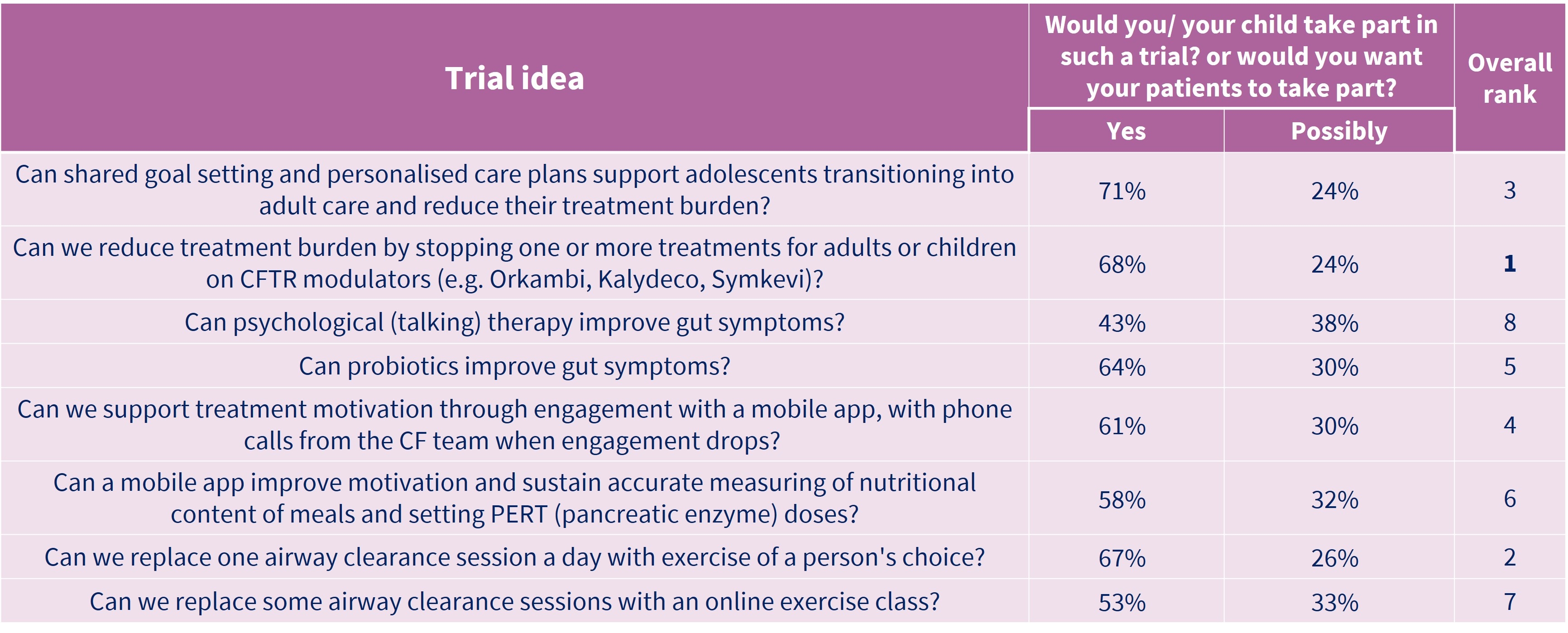Cystic Fibrosis

About this Priority Setting Partnership
There has been considerable change in Cystic Fibrosis treatments since these original priorities were agreed in 2017, as well as a considerable amount of research done against those agreed priorities. The Cystic Fibrosis community has agreed an update to these priorities, in the Cystic Fibrosis Research Priorities Refresh.
In Cystic Fibrosis care there are many situations where we do not know which treatment is best. When the Cystic Fibrosis PSP began its work in early 2016, it estimated that there were over 300 important research questions about cystic fibrosis treatment which were unanswered at the time. The PSP wanted to make sure that the priorities of patients, carers and clinicians were not overlooked in future research.
In response to the initial question gathering survey, the PSP received 482 responses, which included 1,080 questions.
The Cystic Fibrosis PSP published its Top 10 in January 2017. Read more about the results in this press release.
After the success of the PSP, a second phase took a more detailed look at four of the Top 10 priorities to find out what they mean to the people living and working with cystic fibrosis. The PSP completed more in-depth surveys for priorities 1, 2, 6 and 7. They received 2,023 responses in total across the four surveys. The results were used to formulate more specific research questions which are meaningful to the cystic fibrosis community. They then asked the CF community to tell them if the questions were the right ones to be taken forward in a survey that closed on 30th September 2019.
The figure below shows the rankings that respondents gave the specific research questions, and how they felt about the likelihood of patients taking part in the trials.

See other news from this PSP: December 2018, December 2021
Professor Alan Smyth explains the need for a
Priority Setting Partnership in Cystic Fibrosis
Top 10 priorities
There has been considerable change in Cystic Fibrosis treatments since these original priorities were agreed in 2017, as well as a considerable amount of research done against those agreed priorities. These priorities have therefore been updated in the Cystic Fibrosis Research Priorities Refresh.
- What are the effective ways of simplifying the treatment burden of people with Cystic Fibrosis?
- How can we relieve gastro-intestinal (GI) symptoms, such as stomach pain, bloating and nausea in people with Cystic Fibrosis?
- What is the best treatment for non-tuberculous mycobacterium (NTM) in people with Cystic Fibrosis (including when to start and what medication)?
- Which therapies are effective in delaying or preventing progression of lung disease in early life in people with Cystic Fibrosis?
- Is there a way of preventing Cystic Fibrosis related diabetes (CFRD) in people with Cystic Fibrosis?
- What effective ways of motivation, support and technologies help people with Cystic Fibrosis improve and sustain adherence to treatment?
- Can exercise replace chest physiotherapy for people with Cystic Fibrosis?
- Which antibiotic combinations and dosing plans should be used for Cystic Fibrosis exacerbations and should antibiotic combinations be rotated?
- Is there a way of reducing the negative effects of antibiotics eg, resistance risk and adverse symptoms in people with Cystic Fibrosis?
- What is the best way of eradicating Pseudomonas aeruginosa in people with Cystic Fibrosis?
The following questions were also discussed and put in order of priority at the workshop:
- What is the best treatment plan for chronic suppression of Pseudomonas aeruginosa in people with Cystic Fibrosis?
- What is the most effective way of reducing lung inflammation in people with Cystic Fibrosis?
- What types of psychological and family support benefit people with Cystic Fibrosis to have regular treatment and good quality of life?
- What is the most effective management of anxiety and depression in people with Cystic Fibrosis?
- What types or combinations of exercise are most beneficial for people with Cystic Fibrosis at different levels of clinical status?
- How do we manage an ageing population with Cystic Fibrosis?
- What are the long term effects of medications for Cystic Fibrosis?
- What is the best approach for end of life care in people with Cystic Fibrosis?
- What are the long term effects of CFTR modulators, such as Ivacaftor (“Kalydeco”), (including adverse events, quality of life, Cystic Fibrosis related diabetes, reduction in medications and prevention of complications of Cystic Fibrosis)?
- Are there differences in outcomes when IV antibiotics are delivered at home compared with in hospital?